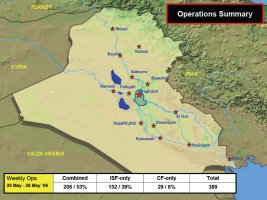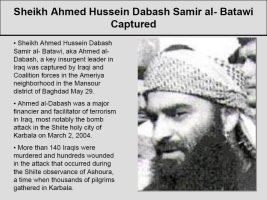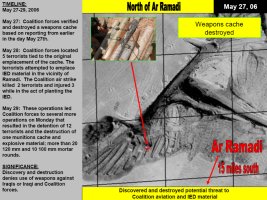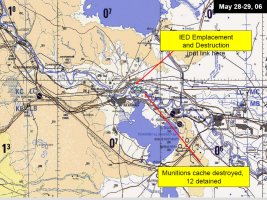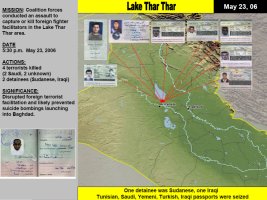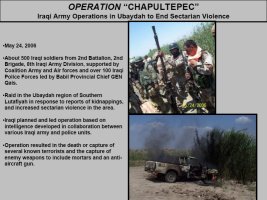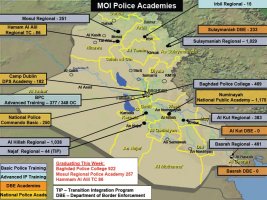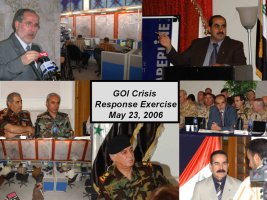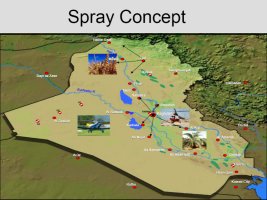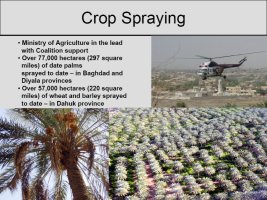
Weekly Press Briefing June 1, 2006 - Maj. Gen. William B. Caldwell IV
Multi-National Force-Iraq
IRAQ OPERATIONAL UPDATE BRIEFING BRIEFER: MAJOR GENERAL WILLIAM CALDWELL, SPOKESMAN, MULTINATIONAL FORCE IRAQ LOCATION: COMBINED PRESS INFORMATION CENTER, BAGHDAD, IRAQ TIME: 8:00 A.M. EDT DATE: THURSDAY, JUNE 1 ,2006
GEN. CALDWELL: Good afternoon, ladies and gentlemen. I'd like to open up today's press conference with a comment about reported events in Hadithah on November 19th of last year.
First, I'd like to express our heartfelt condolences to the families that lost a loved one in that accident. We mourn the loss of all innocent life, and the loss of any life is always very tragic and very unfortunate. But let me be very clear about one point. The coalition does not and it will not tolerate any unethical or criminal behavior. Any allegations of such activities will be fully investigated, and any members found to have committed these violations will be held accountable.
It would be inappropriate for me to comment upon the specific matters under investigation, however, I can tell you in general terms what is going on. On February 14th, Lieutenant General Chiarelli, commander of the Multinational Corps, directed an investigation into the events in Hadithah, where Marines assigned to the Marine Expeditionary Force responded to an IED attack on their convoy. On March 9th, Lieutenant General Chiarelli was presented with the initial findings of that preliminary investigation. Based on the recommendations of the investigating officer, he directed further review of the incident, and that subsequent review is now ongoing. In addition, the Naval Criminal Investigative Service is investigating allegations of misconduct stemming from the Marines' actions. The findings of that criminal investigation will be reported to the commanding general Marine Forces Central Command for appropriate action.
The difference between these two investigations that are going on is that the Multinational Corps Iraq investigation is looking at policies and procedures, such as those pertaining to training and reporting, whereas the Naval Criminal Investigative Service is looking into allegations of criminal misconduct.
This tragic incident is in no way representative of how coalition forces treat Iraqi civilians. Any allegations of unethical or criminal behavior against Iraqi civilians by coalition forces will be thoroughly investigated, and anyone found to have committed violations will be punished as appropriate.
As you all know, we also had a tragic event this week in Baghdad with the loss of our young captain for the Multinational Division Baghdad, an Iraqi contractor and two members of our CBS News team. The individuals lost their lives in doing their jobs -- those in the military serving their country, those working for new outlet carrying out their duties. We wish the six soldiers wounded in that incident a speedy and swift recovery, and to our CBS correspondent, Kimberly Dozier, who's reported, as you all know, news here in Iraq for some time, we wish her a very speedy recovery herself and hope that she'll be back here soon reporting events in Iraq because that is so critical to what's going on in this country to have a free and open press, report it both here in Iraq and worldwide.
If I could, I'd like to switch gears and talk a little about operations in Iraq with y'all and share a couple things that are going on. There has been a real shift in the last two weeks since the Iraqi government was inaugurated. We've seen a lot of activities and events that give us a lot of hope and encouragement as we watch the leadership of the Iraqi government and the Iraqi army and the Iraqi security forces take greater control.
As you know, yesterday, Prime Minister Maliki traveled to Basra. He went down there to reinforce this message of reform, legitimate authority, rule of law and the paramount importance of unity among all Iraqi people. Specifically, he noted that the Iraqis now have a national unity government. As well as the government, he talked about the fact that key to their success is that they all need to part of the solution to solving problems facing this nation; specifically he said: Without security and stability, we can't talk about rebuilding and prosperity. He went on to talk more about unity, security and prosperity for Iraqis, a very positive sign as they were trying to help arbitrate the situation down in Basra, which has been escalating over the last few weeks.
Additionally, as you know, you've heard about the fact that we have moved two battalions from our element down in Kuwait up here into Iraq and that's correct. General Casey, in coordination with the government of Iraq, did receive authority to bring these two battalions in to support current ongoing operations. These two battalions are from the 2nd Brigade of the 1st Armored Division that were already poised and trained on Iraq, and they've been moved up to the Al Anbar province. This is approximately 1,500 soldiers that were moved up, and they're there for a short-term deployment, which in the long term we hope will contribute more to the security and stability in that area. The decision to move these troops, like all, were conditions based. These troops will allow for the summer troop rotations to continue while ensuring that we can also handle ongoing current operations. Commanders in the field will continue to reevaluate the status there, and at which time they're no longer needed, we'll move those forces back to Kuwait.
If I could, first chart, please.
Two weeks ago when we talked, we were looking at Iraqi security forces taking a greater lead, and as you look at that chart, one of the things I think you'll notice is that two weeks ago coalition forces today and this past week only conducted 8 percent of the operations independently by themselves, whereas two weeks ago it was slightly higher than that.
This is a positive trend that we hope to continue seeing as more Iraqi security forces come on line, being trained and ready to assume responsibility in their country.
Again, out of 389 military operations conducted this past week, Iraqi security forces only -- with no coalition support -- conducted almost 40 percent of them.
Chart, please.
This is a -- we put a press release on out this one when we captured him a couple of days ago. When you look at Sheikh Ahmed Hussein Dabbash Amir al-Batawa (sp), he was a key financier and facilitator in the al Qaeda of Iraq network here. His capture is very, very significant to us. As you all know, too, he was also the one that was involved in the holy city of Karabilah bombing in March of 2004 which took over 140 Iraqis' lives and wounded hundreds of others. We truly believe with his capture that this will provide us some critical information as we continue trying to unravel the al Qaeda in Iraq network here in this location.
Next slide, please.
Out in Al Anbar province, we've been focused on terrorists and their weapons, denying attacks on Iraqi civilians and looking at the commerce and infrastructure. This one here is a(n) operation that occurred, again, this past week in the city of Ramadi in which we went after terrorists that were linked to a weapons cache. And from that information associated with the weapons cache, we were able to track these terrorists and then pick them up using overhead aerial assets and found them emplacing an IED. And then from that, were able to bring in coalition aircraft and engage them during that time.
What's important to note is that the IED effort continues down that area. We continue to see al Qaeda-type elements operating down there, and we're making every attempt to continue after them. Again, if it's from a cache the day before that we track them, saw them then emplacing IEDs, we've got that video. We've released that. You can pick that up off the web. That shows that operation as they went in and took out them when they're emplacing an IED.
Next slide, please.
And then from where the IED emplacement was there, not far from there, we also had a -- some intelligent reporting that came out of that. That culminated with us going in with coalition forces and capturing 12 suspected terrorists and a large weapon cache, again, in the close proximity to where they were emplacing the IED.
Next chart, please.
The significance here of this one is, we continue looking at the amount of foreign fighters that are coming into Iraq and being utilized by the al Qaeda network. Down in Lake Tharthar, this operation here this past week, when we went in there, based on intelligence sources again, not only did we find a large cache, uncovering multiple means of use for IEDs and direct assault; we also killed four terrorists, detained two and during that time were able to pick up Yemenis, Saudi, Tunisian and several Iraqi passports, along with some foreign fighters.
If you look at that chart there, those are the actual passports that we picked up on the site. What we did see is a slight increase in the amount of foreign fighters that we have seen from last month to this month that have made their way into Iraq. This month altogether -- that we were able to confirm -- was about 64 foreign fighters that we've either killed or captured in the -- in Iraq.
On Operation Chapultepec -- next slide, please -- the significance of this operation was this was truly one of the first real led -- Iraq-planned and -conducted missions that was conducted. On May 24th, approximately (500 ?) Iraqi soldiers from the 2nd Battalion of the 2nd Brigade of the 8th Iraqi Army Division, supported by coalition army and air forces and over a hundred Iraqi police forces, were led by Babil province chief General Case (sp), who conducted this raid, in response to reports of kidnappings and increased sectarian violence in the area. And out of that, as you can see, they had a very successful operation and found in fact both a weapons cache, and it also resulted in the deaths of several known terrorists down in that location.
Next chart, please.
The training of the Iraqi security forces continue. One of the most critical things we have to do is continue to get the development of the police and the army, as you continuously hear from us, trained and ready to assume greater responsibility within Iraq. Today we've got about 148,000 police in the Ministry of Interior. We'll be going up to 188,000. We have about forty more thousand to train till we bring them up to their full strength.
What you'll see here is the good-news story. Graduating just this week alone will be just over about 1,400 more Iraqi police. We have additional 8,000 that are in training. And these are all the different training sites throughout Iraq that we're currently using. The numbers you see next to one, like right here, implies that we have 1,038 Iraqis and police training at that location, and then it goes around from there.
What's key here is that the Iraqis have also just announced that they're going to establish a Police Ethics and Integrity Center, and we'll see that coming on line in the next few weeks. The minister of Interior made that decision, which we think was a great one, which should encourage leader development, advanced ethical motivation and apply the principles of human rights to their policing.
Next chart, please.
As we work towards the Iraqis taking a greater lead in all the activities in their country, we recently helped them run a government of Iraq exercise, in which we took the Ministry of Interior, the Ministry of Defense and put them through some crisis response vignettes, the purpose not to solve a particular problem but rather look at the method by which they solve the problem. Out of that, you can see the many different members we had both from the government, from the Ministry of Interior and Defense that were involved, and out of that came a better way that they found to exchange information between themselves. It was a great event that we helped facilitate and just finished concluding this past week.
Next chart, please.
As we've discussed, you know, the prime minister is continuing to make the call for all Iraqis to unite together to assume responsibility for their country. We continue to work all the different infrastructure elements. Sometimes it's very difficult for the Iraqis to see the immediate results of an infrastructure project that's been going on long term, but here's two that just recently have just been completed. This first one here, the Wadda (ph) water treatment plant in Baghdad, will bring fresh water to approximately 650,000 people, and that's down in the Karrada district.
The key there was that they brought in a water clarifier, (pits ?) for the flow meters, and a new chlorine system, and then they automated it, too, so that it would run more independently than it has in the past. But it's an important thing bringing fresh water to the people there in Baghdad.
Next slide, please.
In addition to that, of course, is the whole point with electricity, water and electricity being two of the basic services that the people of Iraq keep telling their leadership that they wanted to have fixed. And this one here is a substation that will provide electric support to almost 50,000 Iraqi residents down in the Massad (sp) Dhi Qar province. And that's just coming on line, too, this week.
Next slide, please.
What's key -- and I know we've talked this before -- but as the Iraqis -- people keep talking to their leadership, one of the key things that farmers have said is that we have got to take on spraying the crops. And the crop spraying event has actually just about come to a conclusion now. As you know, since the fall of Saddam's regime, we had not done any crop spraying. This is the first major effort. The Iraqi government took the lead, with us in support. We've now sprayed just over 77,000 hectares or about 300 square miles of date palms. In addition to that, we've also done the spraying of both their wheat and barley crops. As you know, right behind oil, dates were the next-largest export for the country of Iraq. And they also import right now up to about 300 million tons of grain annually for their people. So the idea of spraying both the wheat and barley is very, very important so that we can, hopefully, boost revenues in the date exportation, and then reduce the amount of money going out as we increase the amount of crops we grow here in our own country.
Those are the key points I just want to highlight today. With that, I'll open up and take any questions anybody may have.
Yes, sir? Go ahead.
Q (Off mike) -- Radio. You mentioned -- what are those two battalions, what specifically will they be doing -- as much as you can tell, without compromising operational security. Are they going to be training Iraqi police? Are they going to be providing security, going into the city and hunting down terrorists? GEN. CALDWELL: I'd say the best way to look at them, they're going to be like a bridging force. During the summer rotation period that will occur out there in Al Anbar province, there'll be a lot of coalition forces that will be moving out and others coming in. And these two battalions, about 1,500 soldiers, will provide what's probably best thought of as a bridging force to ensure that we have the continuity to continue conducting our current operations that are already planned and being executed.
Yes, sir?
Q Ned Parker with the Times of London. I just wanted to ask you about -- get some more detail about this new training that has been ordered because of the Hadithah incident, what it entails for the troops, beyond the slide presentation. And does it also -- is it also for British troops and other coalition forces?
GEN. CALDWELL: Yeah. Obviously, General Chiarelli, commander of the Multinational Corps, can best answer that. It's his training program. But the essence of it is, it's to reinforce and sustain training that all the troops of the coalition forces received before they got here. It's values-based. And, obviously, his intent is to make sure that it adheres to legal, moral and ethical standards that every military member should be adhering to on the battlefield. And that's sort of the sum of it. And I probably need to refer you to the corps to talk through the specifics of it. But it is -- you're right, they just instituted that, and they're starting that program today.
And he's given 30 days to execute that across the entire multinational corps.
Q How many hours is it? How many hours of training is it?
GEN. CALDWELL: I'd really probably need to let the corps come back and answer those questions if you don't mind. I am not that familiar with the whole program. I have not studied it in detail. I do know that it just got released today. But the key is, the intent is to reinforce and sustain training that every member of the coalition force had before they arrived here, and again, it's focused on values; you know, looking at the legal, the moral and the ethical standards that every one of us in uniform that are here as guests of the Iraqi government need to adhere to.
Q I mean, does the Hadithah incident -- (inaudible) -- one to believe or be concerned about problems like Hadithah or excessive use of force are a problem from time to time? In -- with a --
GEN. CALDWELL: Yeah. What I'd tell you -- just like our chairman of the Joint Chiefs of Staff said the other day, 99.9 percent of every man and woman serving over here in uniform are adhering to the highest standards of legal, moral and ethical values that you can possibly think of. And the Hadithah incident is being thoroughly investigated, and as we have said before, we will absolutely will not and do not allow for any criminal or unethical behavior by anybody serving in uniform to the Iraqi people.
Q Does this include British troops as well?
GEN. CALDWELL: Yes, the entire multinational corps is going to go through this training.
Yes, sir.
Q (Name off mike) -- AFP. Yesterday, there was an incident up in the Samarra area, where two women were killed at a checkpoint. I believe it's described as an escalation of force, I think, is the phrase used for it. I just want to get a sense of how often these incidents happen where someone doesn't obey the rules of a checkpoint or of a patrol and shots are fired, if this -- how common something like this is.
GEN. CALDWELL: You know, I do not know that answer. I'm sure there's some kind of data that's kept on that, but I just off-hand can't answer that for you. I do know General Chiarelli in the last several months has made a very concerted effort to reduce the possibility of having to move to escalation of force, and he's taken some real deliberate steps and guidance in that respect. But the actual statistics associated with that I don't have off-hand.
Q (Off mike.)
GEN. CALDWELL: We can check with the corps. I mean, they'd be the ones that would best have that data. But sure, we'll follow up on that with you and give you something back. I'm not sure -- quite sure what it is, but we'll give you something back.
Yes, ma'am.
Q I'm Liz Sly with The Chicago Tribune.
To follow up that, really, all your predecessors here have refused to tell us the number of civilians that have been shot dead by American forces over these years. They've told us that the figures aren't kept, that the U.S. military doesn't track the number of civilians that have been shot dead by U.S. forces.
But in light of this incident, maybe it would be helpful for people to know the actual numbers, perhaps to know that -- how often these incidents do occur, whether there have been other incidents like this in the past or not. Would it be possible for you to request to see if these figures are in fact kept and whether we could have them?
GEN. CALDWELL: I can look into that. I have never seen it reported where there's some kind of cumulative number on any kind of daily reporting that I've seen, but we can look into that.
I think what you've got to be cautious of is, you know, any time there's a situation involving civilians that are hurt during an engagement with anti-Iraqi elements, you're never quite sure who may have in fact injured those civilians.
What I can tell you is the number of civilian deaths are in fact on the rise, but not by military forces. It's by the anti-Iraqi elements that have made a very deliberate and conscious effort over these last two months, as I've looked at the statistics, to target innocent civilians for no reason at all. They're not combatants, and yet for some reason these anti-Iraq elements continue to go out and target Iraqi civilians through intimidation, through murder, through kidnappings. But it isn't being done by the armed forces of the coalition.
Q Just to follow that, if the figures are not in fact being tracked and no effort is being made to keep track of how many civilians are shot dead by U.S. forces, in light of the Hadithah incident, would it not be perhaps useful to start tracking those figures, so that you could see how pervasive the problem is, if it exists at all?
GEN. CALDWELL: Right. I would say -- I'm certain somebody is looking at that very closely. Otherwise, I don't think you would have seen General Chiarelli make such a concerted effort over the last few months to reduce the amount of times that coalition forces have to go to escalation of force. So clearly there's somebody who's very much aware and tracking those things. What I said is, I don't see that on a regular basis.
Yes, ma'am?
Q Hi. Louise Roug, LA Times. Just a follow-on to Ben's question about Ramadi. You know, descriptions that we're getting from people out there is that terrorists are in control of large parts of the city, that there's an escalating humanitarian crisis.
Maybe if you can just explain a little bit about the situation in Ramadi.
GEN. CALDWELL: Well, the situation in Ramadi, just like in Baghdad, is serious at this time. I mean -- and it's something we're paying a lot of attention to. I know the Marine elements there have made a very concerted effort, as the rest of the coalition force has, to focus on the al Qaeda network, which has taken advantage of some sectarian differences out there in trying to foment more violence between those groups.
That's also one of the clear lines, as you look at where foreign fighters can come in through Syria -- that's probably, as they say, one of those lines adrift where they come would through that location down there, too. So it's an area we've been looking at very closely from the multinational force.
We are very concerned about Ramadi. It's got a lot of attention. I mean, if you look, you'll see the sheikh that was just recently murdered out there because -- the tribal sheikh because he had made an open statement that he and his tribe for the last two or three months were going to openly support the coalition forces' effort, because he didn't want al Qaeda in Iraq operating out there. And so what did they do? They used murder to go ahead and eliminate him so they could intimidate others not to support the coalition forces.
There's nothing more than they would love just to stop the government of Iraq from being successful. I mean, that's very clear, as we stated, when we all talked about -- when the inauguration occurred, we knew that there would be a step up in violence, and that's exactly what they would like to do is to see this government fail. And yet, this is a duly elected government by the people that's trying to bring the country together and unify it, and we all very much want to support them in doing that.
Q Just a follow-up question. Earlier this year -- (off mike) -- foreign fighters, and then this spring there was a series of assassinations of those people -- (off mike). How much of a blow was that to your -- (off mike)?
GEN. CALDWELL: Well, clearly any time that any innocent Iraqi civilian is murdered by the al Qaeda in Iraq or some other anti-Iraq element, that's a disappointment. I mean, first of all, it's a tragic loss of innocent life. But more importantly, it's a tragic loss because those Iraqis are the ones who are trying to take back control of their country, and they don't want these foreigners and they don't want this violence to occur anymore. They want to live a happy and peaceful life, just like anybody else does. So it is a setback, obviously, when that does occur.
But I think the thing that we keep being amazed at is the number of Iraqis that keep stepping forward, that have decided that they are going to take back control of their country, and they're not afraid to do it. I just look at the mayor out there. He's had 29 different attempts on his life made in some shape or form or another, and yet, just last week, when -- or week before last, when I was out there, there he was in the governance center downtown, at work working hard and dedicated and committed and determined that he's going to help the people in Al Anbar province gain that freedom and prosperity that the rest of Iraq is seeking to get.
Yes, sir?
Q Ferry Biedermann, Financial Times. I want to get back to the Haditha incident and the review of core ethical values. Was anything similar ordered after earlier incidents; for example, Abu Ghraib and what happened with the Brits in Basra? Are you aware of that? Was anything similar done?
GEN. CALDWELL: That's a great question. I just -- I did not ask that. I can go back and find out. I mean, that's something we can easily find out.
Q And is anything else being done? Apart from a review of these values, is anything being done about supervision, monitoring of the troops in the field, any closer -- any look at -- (inaudible)?
GEN. CALDWELL: Well, clearly the whole reason why we have two different investigations going on, you've got the one, which is a criminal investigation, being done by the Naval Criminal Investigative Service into the alleged criminal activity of those Marines, but separately and distinct is the one that General Chiarelli has ordered for him, and that's looking at everything. That includes procedures, training, implementation of orders, execution of orders. He's got a very comprehensive investigation that's ongoing that will come back to him. And I think from that -- whatever those results are, he'll make the determination which elements of the recommendations that come back to him he wants to implement within country.
Yes, ma'am?
Q (Off mike) -- from Newsweek. You mentioned that you investigate all allegations of any kind of misconduct. How many -- do you have any allegations that are -- or investigations that are ongoing right now, besides from the Haditha investigation?
GEN. CALDWELL: There are a couple of investigations ongoing at this time, which I'm not at liberty to talk about because they're ongoing investigations, but there are a couple at this time.
Q About how many?
GEN. CALDWELL: I'd have to get the exact number, but I know there's about three or four, at least, going on at this time. Q (Off mike.)
GEN. CALDWELL: When there's been a reported death of an Iraqi civilian, they look at the circumstances surrounding that to determine whether or not it could have been done by coalition forces.
If they think it could have been done by coalition forces, then there's an informal investigation conducted. Based on the results of that, which are passed to the commander in the field, he or she looks at those results, and if they determine it could be -- or if the recommendation is there could be something criminal in nature, then they'll call for a criminal investigation, along with -- probably like General Chiarelli has done -- another investigation to look at the procedures and methods by which we're training, reporting and executing our orders in the field.
Q Do you involve Iraqis in the investigation at all?
GEN. CALDWELL: I'm not in the investigations themselves. I do know that the Naval Criminal Investigation Service has been talking to the Iraqi government. To what extent, how much information they're sharing, all that, I'm not privy to. But I do know they've been talking to the Iraqi government.
Yes, sir?
Q Just to go back to the escalation of force question, you talked about Chiarelli's concerted efforts to not go there. What would these efforts be, exactly? What sort of measures was he working on so that these do not come about?
GEN. CALDWELL: I have not gone back and studied it. But, obviously, what General Chiarelli is concerned about, I mean when you put a young man or woman out there at a checkpoint and they've got a car speeding at them at a high rate of speed and not observing the signals and requirements to slow down, that gives you grave concern that could be a vehicle borne improvised explosive device or suicide- bomber in that car with the intent to kill, maim and injure innocent civilians and those in the coalition force. I know General Chiarelli has been looking at everything -- I'd have to go back and ask them to tell you the exact specifics. But he's looked at everything from how they set the checkpoint up, to what are the visual signs that they're actually using; do they need to be changed and be made different? I know he's looked at this very thoroughly, I just haven't personally studied it. But again, we can have the corps give you a response to that, if you would like.
Okay. Yes, sir?
Q Thank you. When you said there may be three or four other investigations, so you're saying obviously these aren't the informal ones they do initially, you're talking about official -- what's your definition, then, of what the three or four investigations are? Those are official investigations by -- after the informal investigation?
GEN. CALDWELL: I'd have to go back and look at the exact stage they're in. But I do know that at least the informal part of the investigation is going on. I probably need to get the technical terms to give you exactly what that means. But I know there's at least three other investigations that we're looking at closely at this time to determine -- they're in the first stage of looking at them, that have not gone -- been completed yet and gone to the commanders for their decisions.
Q And have you announced these? Because you announced one of a single Iraqi who was killed in Hamandiyah, the one out west also, which was about three or four weeks ago.
GEN. CALDWELL: Right.
Q Have the other one or two been announced like that?
GEN. CALDWELL: No, they haven't. Not yet. Again, they're really in that first stage of looking at them at this point.
Yes, ma'am?
Q Do you have any sense of how many investigations there have been overall into these kind of incidents, and how many like go to -- after the informal stage, go to a formal stage?
GEN. CALDWELL: There is data available like that that is maintained and kept, but it's not something that's put out. One of the things we encourage commanders in the field to do is if they have any questions whether something was done proper or improper -- I'm not talking about resulting in the loss of life, just is something was done proper or improper -- that we encourage them to conduct a investigation. One of the things you have got to do is maintain your integrity and your transparency in everything you do. So we highly encourage commanders -- and that's the reason why you could look at data and get it very skewed. But we highly encourage commanders, do not be afraid to conduct an investigation into anything that you feel may be improper or not correct, to ensure that there's nothing wrong there.
Q So what is an informal investigation, exactly? Who investigates an informal one? Is that just the unit involved in sort of looking at its own procedures and deciding? Or does somebody come outside informally?
GEN. CALDWELL: You can do it from many different -- I mean, there's multiple ways that it can be done, depending on the severity of what you're investigating, the rank of the senior person that you think that might be involved. Obviously, any time an investigation's done, if you think that there could be the possibility that a young lieutenant is involved, then as a minimum, you've got to have a captain conducting the investigation, somebody senior to the person that could be involved in the investigation. But people can do them at many different levels. A young company commander, a captain, can ask for an investigation be done. A battalion commander can ask for it, a brigade commander, a division commander. I mean, at any level in a chain of command, if you're in a leadership position and you feel something was not done properly or correctly -- again, everything from a contract wasn't properly awarded, to payment wasn't properly made, to whatever it may be, you can conduct an informal investigation to establish the facts, to see what the investigating officer makes as their recommendations back to the person who asked for the investigation to be done.
It's supposed to be an impartial person not directly connected to that immediate chain of command, that comes in and does it. And then they report their recommendation, the results back to the person who asked for the investigation.
STAFF: We have time for one more question.
GEN. CALDWELL: Yeah, sir?
Q (Name off mike.) Can you give us an idea about -- for instance, the guys that worked in Hadithah, what rules are you playing by? Because there's always a very big discrepancy between what you say and what civilians say, the relatives (of those) who were killed say. Can we have an idea of what your rules are when you go into a village, a bomb goes off, what are you authorized to do?
GEN. CALDWELL: You know, every situation out there in the field is so very, very different. You have the rule of law that everybody follows and adheres to. We are always very, very aware of and concerned about innocent civilians ever being injured in any type of conflict that we're in. To talk specifically about that case there that's under investigation, that's exactly why -- one of the reasons we have the investigation going on, so we can clearly establish what did or did not occur on the 19th of November last year. We want to know what actually happened. We want to know the truth, the ground truth of what occurred. And that's why that investigation is ongoing at this time.
Q But in general, what are you authorized to do? You have so many cases of people saying a civilian was killed in a car, a pregnant woman here, this guy there. What are you authorized to do? What are your rules of engagement? Can you tell us any idea, you know, because no one has any sort of -- nothing to judge by.
GEN. CALDWELL: Yeah, there's a clear measurement out in the field. And the young men and women who are out there are taught exactly what the rules of engagement are in terms of whether it be escalation of force. What you're going to find, as a general rule, that a young man or woman is not going to engage somebody unless it is a hostile force, and a hostile force means you feel that your life is personally threatened, or you see -- in a case it may be something where they're moving towards your location with weapons in their hand with clearly hostile intent. I mean, I can -- I'll get the lawyers to give you a very clear definition that we use for the training of our troops, which would be a better thing to use than having me sit up here and try to explain it to you. But I don't think there's any question in our mind, if you're carrying a locked and loaded weapon, you're not going to pick it up and aim it at somebody unless you feel your life is threatened. The key thing to remember is, as we tell all the members of the coalition force here, we're here as guests of the Iraqi government, we're here as guests of the Iraqi people, and as such, that's exactly how we should conduct ourselves.
Okay, I think that's it, then. All right, thank you very much.
END.
|
NEWSLETTER
|
| Join the GlobalSecurity.org mailing list |
|
|
|


